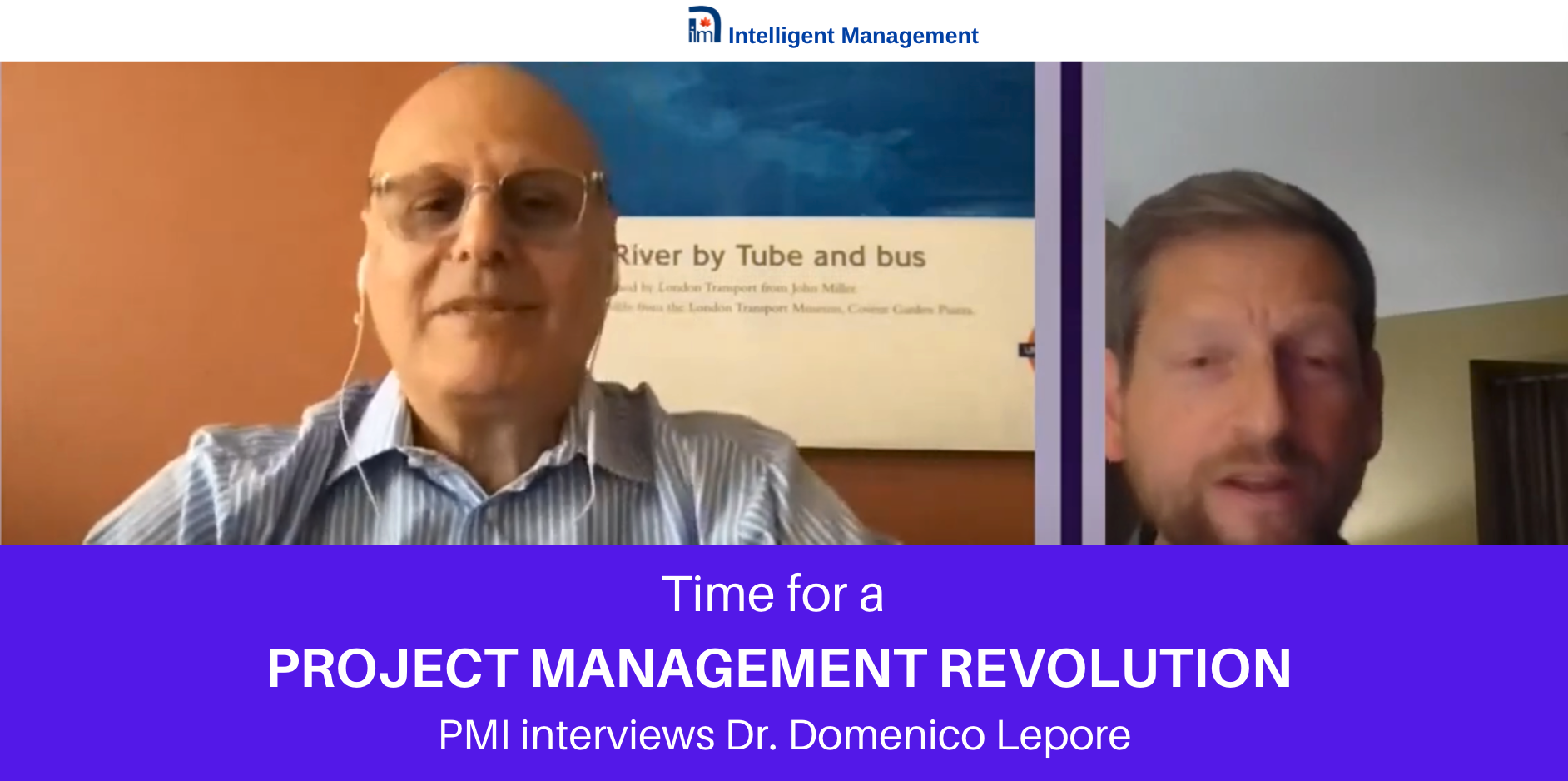
Every one of us is impacted by Project Management. It affects our lives in every capacity, as business owners and leaders, employees and citizens. Sadly, most projects, whether they are private or government run, fail to come in on time and within budget. But it doesn’t have to be this way. There is a systemic approach to Project Management that has been around for years and is used very effectively in various sectors, including aerospace and military.
Our Founder, Dr. Domenico Lepore, was one of a small circle of people who received a galley copy from Eliyahu Goldratt of his revolutionary book on Project Management called ‘Critical Chain’ before it was published. Critical Chain has become for us at Intelligent Management so much more than Project Management. It IS management and every organization can vastly improve their performance by adopting it.
In spite of our differences of opinion with the Project Management Institute (PMI) that continues to train thousands of people globally every year in techniques that do not work, they still invite us to present our ideas. Most recently, the PMI chapter of Southern Maryland interviewed Domenico Lepore, giving him space to speak freely and unabashedly, as is his style, about what is wrong with Project Management and what, instead, Project Management can become–an engine for systemic change.
Below are just a few extracts from the interview but you can dive in anywhere in this video (after minute 15) to hear stuff about what Project Management can do that you won’t hear anywhere else. Enjoy!
PMI: So what are these approaches (Deming and Goldratt) so big? What do they fundamentally solve?
LEPORE: At the highest possible level, they address something there is no trace in literature, managerial literature, which is what emerges out of interdependencies that exist in the real world. So, as you remember, in the early 90s, the discourse was entirely dominated by cost accounting considerations that look at the world in terms of fragments, and they look at the optimal of an organization as the summation of the local optima and nothing could be further from the truth. So both of them address that massively. Dr. Deming particularly stresses the importance of variation within the system. And Dr. Goldratt emphasizes the importance of a focusing point which equals a constraint, not the bottleneck but simply the leverage point of the system where maximum value is generated. There is no other approach, especially the ones that were peddled in the 90s and early 2000s that paid any attention to the idea of complexity and how it can be addressed.
PMI: Can you tell me about this systems approach with project management?
LEPORE: In project management, I would like to emphasize that, by far the most important of the two words is management. Because all organizations do is to run projects, otherwise they wouldn’t be making any money. So the emphasis is on management. And secondly, in the real world, as you know, we deal with something that everybody is extremely familiar: the finite capacity of resources in terms of competencies and machines that we can leverage. So if we want to do something in management, which is in the real world, we have to start focusing on what we really have available, and now we have to manage it. And you mentioned the word. So let me pay an homage to my ancestors. Management is a word that comes from Latin and is composed of “manus” which comes from hand and “agere” which is acting and that is exactly what management does. Management does practical things. So, management should be about managing an organization of finite resources for a goal.
PMI: Do we need to rely on our project managers more? What are you suggesting here?
Project Managers should be the vessel for a different way. A more aware way of managing the resources that we have available. So I think that the burden should rest on the shoulders of the decision makers who should want project managers to transform their ideas into reality. Unfortunately, the vast majority of corporations are mired in a series of cognitive traps. Many stem from the wrong accounting, many others from the gimmickry of Wall Street and short term thinking and there is this enormous gulf between what operations really need to thrive and the way decisions are made. There is too much bean counting. There is very little attention to what truly matters, which is interdependencies and how these interdependencies or network or conversation should be oriented towards the goal. I think Project Managers should rise to the occasion and vocally claim a bigger latitude and a different education in the way they manage the finite resources they have available. But that has to start from the top from the boardroom.
You can watch the interview with Domenico below from MINUTE 15 ONWARDS:
To find out more about ten guided steps to a systemic leap for your company, contact Angela Montgomery at intelligentmanagement@sechel.ws
SCHEDULE AN INTRODUCTORY CALL WITH US
Intelligent Management works with decision makers with the authority and responsibility to make meaningful change. We have helped dozens of organizations to adopt a systemic approach to manage complexity and radically improve performance and growth for 25 years through our Decalogue management methodology. The Network of Projects organization design we developed is supported by our Ess3ntial software for multi-project finite scheduling based on the Critical Chain algorithm.
See our latest books Moving the Chains: An Operational Solution for Embracing Complexity in the Digital Age by our Founder Dr. Domenico Lepore, The Human Constraint – a digital business novel that has sold in 43 countries so far by Dr. Angela Montgomery and ‘Quality, Involvement, Flow: The Systemic Organization’ from CRC Press, New York by Dr. Domenico Lepore, Dr. .Angela Montgomery and Dr. Giovanni Siepe.






Leave a Reply